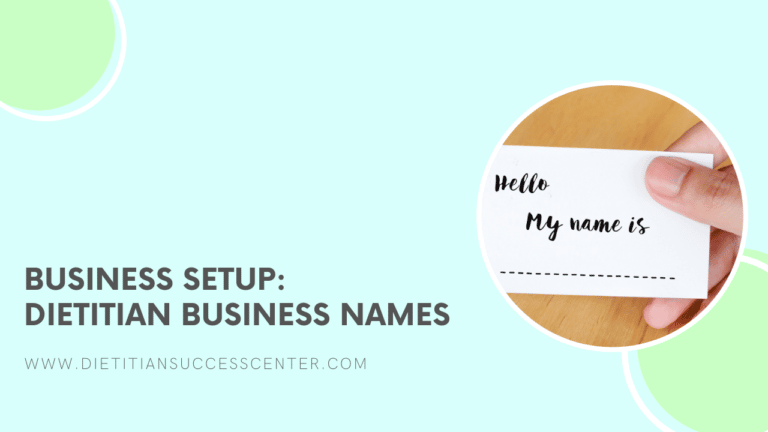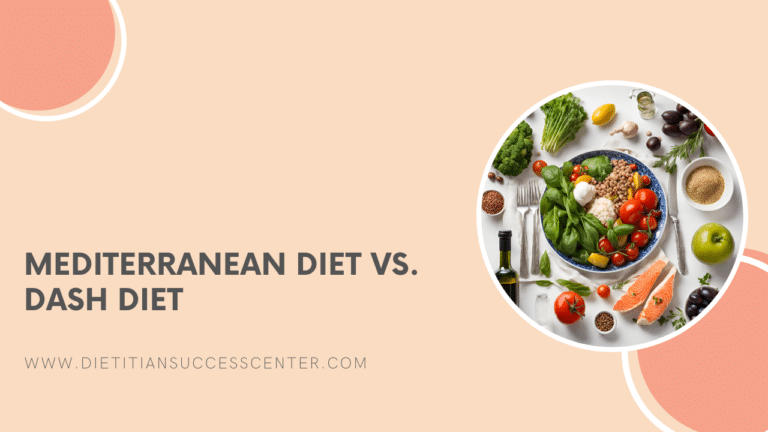
Hey there! It’s Krista, your dietitian business coach. I want to share my best tips on defining your nutrition niche.
Do you feel like defining your nutrition niche is a stumbling block while thinking about the business you want to build?
Defining your niche can bring clarity and focus to your nutrition business idea in terms of who you are trying to attract to your services, product or offer.
“If you’re speaking to everyone, you’re speaking to no one.” – Seth Godin
Listen to my podcast episode on how to define your niche
Get started with my FREE Dietitian Business Planning Workbook for a step-by-step breakdown on how to create your dietitian business plan, steps for how to define your niche and pricing and marketing strategies, as well as goal setting tips.

In Dietitian Success Center’s Defining your Niche course, one of our many business courses for dietitians, we review how to get clear on your target audience and ideal client. You also gain access to our Defining Your Niche worksheet where you can put these steps into action.
Defining your Niche is a Foundational Business Step
Defining nutrition niche ideas is an important first step in your dietitian’s business plan. Coming up with a business name is often the first place people start, but we want to come up with our target audience and ideal client profile first. Once we know who our ideal client is, we can come up with branding and nutrition business ideas that will serve this person.
-
- Having a clear sense of your target audience helps you:
-
- Understand their unique challenges and where you can solve their problems and answer their questions
-
- Know exactly what to talk to them about on social media, your website, etc.
-
- Come up with content and offers that serve them
-
- Having a clear sense of your target audience helps you:
The Niche Funnel
We can think of nutrition niches like a funnel.
“Generalist” is the widest part of the funnel (at the top). Generalists don’t have a focus population that they work with. There are a lot of practitioners that consider themselves generalists, so consequently, there’s a lot of competition with people who are doing the same thing.
At the bottom of the funnel is “Specialist”. There are fewer practitioners in this area and less competition.
If you had a specific medical condition, would you rather see a generalist or a specialist?
You might be wondering if a specialized population would be too small. Keep in mind, there are a lot of people in this world and a lot of people that need the help of a dietitian. No matter how specific your niche, there are going to be a lot of people that could use your help.
Benefits of Building an Expertise
Getting more focused and specific has many benefits:
-
- You become the subject matter expert instead of feeling like a generalist
-
- It permits you to build your competence and confidence in a specific area
-
- You become the go-to person on that topic and will be approached for more opportunities in that area (like speaking engagements, interviews) because you have a specific subject matter expertise
Niche your Business
There are several different ways we can niche our business, not just solely nutrition niches:
-
- Nutrition-Related Condition: ex.PCOS, IBS, Mental Health
-
- Life Stage: ex. women going through menopause, toddlers
-
- Need State (the specific needs of a nutrition group): varsity athletes, post-pregnancy
-
- Philosophy: ex. intermittent fasting, intuitive eating, HAES™, macro counting
Troubleshooting Nutrition Niches
-
- Something to keep in mind – just because you are defining an ideal client, doesn’t mean you will ONLY attract this person. However, the goal is to attract more of this type of person.
-
- Choosing a niche doesn’t mean you’re stuck with it. Sometimes it takes time to figure out a target population group that you are passionate about working with. You can always pivot in the future.
-
- An ideal client provides you with focus and direction. You don’t have to show up everywhere.
-
- Niching allows you to prioritize your efforts so you don’t have to cover everything and don’t have to show up everywhere.
Defining a niche is often a stumbling block for dietitians and students, as they think about building a business. There might be imposter syndrome at play (what if you want to work with a population group but question if you truly have the expertise?). Remember, in the words of Seth Godin, “if you are speaking to everyone, you are speaking to no one”. We want to have a focus in terms of who we are trying to attract to our business.
Work through the steps of building your business, defining your ideal client profile, and writing your “I help” statement in DSC’s business courses for dietitians.
Dietitian Success Center is THE professional development resource for dietitians and dietetic students. Our mission is to make it easier for dietitians and dietetic students to build expertise. We do this through evidence-based online nutrition courses, community, and ready-to-use client handouts. Plus – we give you the tools to start and grow your dietitian private practice!









